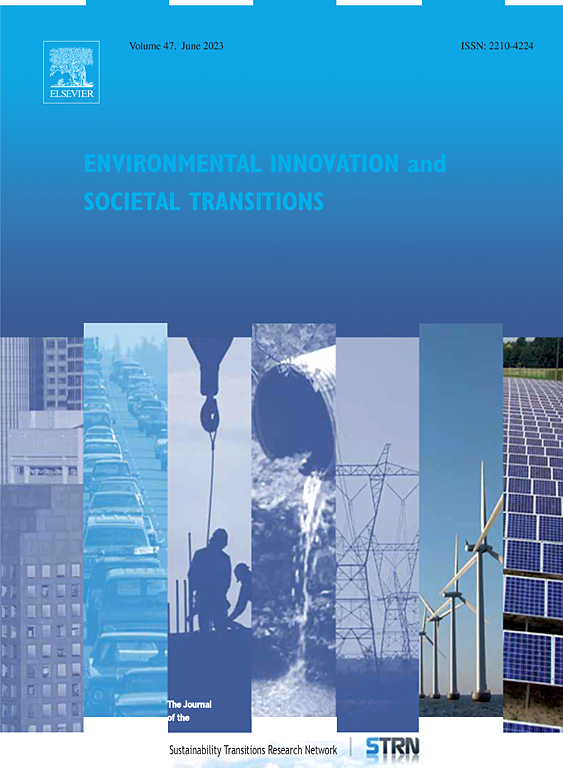Challenge accepted: Sub-national government authorities and the legitimacy of co-creative redevelopment projects in fossil-industrial regions
IF 5.7
2区 经济学
Q1 ENVIRONMENTAL SCIENCES
Environmental Innovation and Societal Transitions
Pub Date : 2025-01-17
DOI:10.1016/j.eist.2025.100962
引用次数: 0
Abstract
Regions reliant on declining fossil fuel production often grapple with upcoming deindustrialisation, economic decline, and deterioration of liveability. In attempts to address these issues proactively, local change agents, including sub-national government authorities, increasingly collaborate to develop new, more sustainable and just regional pathways. A potential yet not uncontested stepping stone towards such pathways is co-creative asset redevelopment. In this paper, we focus on the role of sub-national government authorities in co-creative redevelopment. Particularly, we zoom in on the legitimacy challenges that these authorities face and must address for co-creative redevelopment to have transformative capacity. We draw on insights from the case of GZI Next in Emmen, the Netherlands, and identify six challenges, amongst others intra-organisational conflicts of interests, accountability issues, and competing claims to the right to a just transition. We reflect on these challenges and how to overcome them and propose avenues for future research.
接受挑战:地方政府当局和化石工业地区共同创造再开发项目的合法性
依赖日益减少的化石燃料生产的地区往往面临着即将到来的去工业化、经济衰退和宜居性恶化的问题。为了积极主动地解决这些问题,地方变革推动者,包括地方政府当局,越来越多地合作开发新的、更可持续的、更公正的区域途径。共同创造资产再开发是迈向这条道路的一个潜在但并非毫无争议的踏脚石。在本文中,我们关注地方政府当局在共同创意再开发中的作用。特别是,我们聚焦于这些当局面临的合法性挑战,以及必须解决的共同创意再开发的变革能力。我们从荷兰埃门的GZI Next案例中吸取了经验教训,并确定了六个挑战,其中包括组织内部利益冲突、问责问题和对公正过渡权利的相互竞争要求。我们反思这些挑战以及如何克服它们,并为未来的研究提出途径。
本文章由计算机程序翻译,如有差异,请以英文原文为准。
求助全文
约1分钟内获得全文
求助全文
来源期刊

Environmental Innovation and Societal Transitions
Energy-Renewable Energy, Sustainability and the Environment
CiteScore
13.60
自引率
19.40%
发文量
90
审稿时长
56 days
期刊介绍:
Environmental Innovation and Societal Transitions serves as a platform for reporting studies on innovations and socio-economic transitions aimed at fostering an environmentally sustainable economy, thereby addressing structural resource scarcity and environmental challenges, particularly those associated with fossil energy use and climate change. The journal focuses on various forms of innovation, including technological, organizational, economic, institutional, and political, as well as economy-wide and sectoral changes in areas such as energy, transport, agriculture, and water management. It endeavors to tackle complex questions concerning social, economic, behavioral-psychological, and political barriers and opportunities, along with their intricate interactions. With a multidisciplinary approach and methodological openness, the journal welcomes contributions from a wide array of disciplines within the social, environmental, and innovation sciences.
 求助内容:
求助内容: 应助结果提醒方式:
应助结果提醒方式:


